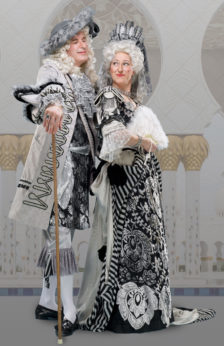
SAN FRANCISCO — The Gondoliers, or The King of Barataria is not amongst Gilbert & Sullivan’s most familiar operas—those would be The Mikado, Iolanthe, The Pirates of Penzance and H.M.S. Pinafore—but it is G&S at their most extravagantly utopian.
While all of their work pointedly skewers the British class and caste system with a poison-tipped pen, none goes quite so far as The Gondoliers in actually offering a blueprint for the classless society. Even, as long as it lasts, the monarchy is a collective proposition shared between erstwhile Venetian gondoliers Marco (Michael Desnoyers) and Giuseppe Palmieri (Samuel Rabinowitz) who suddenly find themselves plucked from the Grand Canal and sharing the throne of a lush island country full of the most fervently, democratically-minded citizenry you could find this side of the beleaguered anarchist commune of Catalonia during the Spanish Civil War.
Chairman Mao’s admonition may have been “Serve the people,” but here we see the dual monarchs busying themselves polishing the shoes of the Baratarians and tuning their mandolins. Since they are acting, for the nonce, collaboratively as one public servant, they even have to plead their case for double rations at mealtime, for after all they are still two separate people. The generous-hearted populace graciously consents.
One can only wonder, did someone prior to The Gondoliers’ premiere at the Savoy Theatre in December 1889 slip a copy of the 1848 Communist Manifesto into the satirical, fun-loving hands of Messrs G&S? It sure sounds like “From everyone according to their ability, to each according to their need” set to a rollicking musical score.
Curiously, despite the trenchant critique of the royal classes and monarchs in particular, The Gondoliers was the first of all the G&S operas to be given a command performance, at the order of Queen Victoria, at Windsor Castle, with her grandson Prince George (later to become King George V) in attendance.
A memorable exchange took place at that performance between the company director Richard D’Oyly Carte and Victoria the Empress of India and the rest of the British Empire upon which the sun never set. As told by master G&S performer Martyn Green in his authoritative Treasury of Gilbert & Sullivan, “Her Majesty had observed that certain additions had been made to the text by some of the principals, and after the performance she asked Mr. Carte the reason for that.
“‘Those, Your Majesty,’ said Mr. Carte, ‘are what we call gags.’
“‘Gags?’ replied the Queen”—no doubt thinking of her police and military out in the colonies. “‘I thought gags were things that were put by authority into people’s mouths.’
“‘These gags, Your Majesty,’ said Mr. Carte, ‘are things these people put into their own mouths without authority.’”
Neither librettist nor composer went to that performance. In fact, G&S were going through a rough patch in their often troubled partnership. For one thing, Sullivan aspired to write a serious grand opera, and Gilbert declined to write the libretto, feeling less than confident about his ability to conjure anything in other than a comedic mode. Sullivan did find a librettist for his opera Ivanhoe, which premiered in London even as The Gondoliers was enjoying its fairly successful run. The grand opera fizzled, however, and is all but forgotten.
The G&S quarrel escalated, and their partnership resumed only for two final works, Utopia, Limited (interesting title following The Gondoliers!) and The Grand Duke, neither of which became popular. So The Gondoliers is effectively the last work for which G&S are remembered.
The Gondoliers contains most of the hallmarks of a G&S work: ample choruses of men and women pining for marriage, ardent lovers thwarted by social convention, switched identities, titled men exerting mostly inherited power they certainly did not earn, their domineering lady partners, comical, almost lovably evil villains, and an improbable plot spilling over with complications that are resolved in the last few minutes by means of a humble woman’s timely confession. The only G&S prerequisite missing here, or perhaps simply toned down, is the standard virtuoso patter song.
The two would be/might be kings Marco and Giuseppe are paired with their Venetian peasant girl lovers Tessa (Whitney Steele) and Gianetta (Amy Foote), both of whom dream of their life as a queen, whichever one of their gondolier husbands is named king of Barataria. It apparently was considered in their day no act of lèse majesté (an assault on the monarch) for Gilbert to write lyrics for this foursome about the queen who will “sit on a golden throne…diamonds all her own…with beautiful silver shoes to wear upon her dainty feet…and as much as she wants to eat!…Whenever she condescends to walk…with her haughty stare and her nose in the air…And noble lords will scrape and bow, and double themselves in two, and open their eyes in blank surprise at whatever she likes to do.”
At the command performance, Queen Victoria, described by a cast member as “a little squat figure in black,” apparently enjoyed this particular number, even beating time with the singers who fantasized about their life as “a right-down regular Royal Queen.”
So what kind of king would Marco or Giuseppe be? In Venice they are introduced to the Spanish dignitaries who are searching for the lost child-king married at birth to their daughter Casilda (Patricia Westley), and Giuseppe explains who he and Marco are: “Jolly gondoliers, the sons of Baptisto Palmieri, who led the last revolution. Republicans, heart and soul, we hold all men to be equal. As we abhor oppression, we abhor kings; as we detest vain-glory, we detest rank: as we despise effeminacy, we despise wealth. We are Venetian gondoliers—your equals in everything except our calling, and in that at once your masters and your servants.”
Later, to the Baratarians they state (as one persona): “I’m aware you object to pavilions and palaces, But you’ll find I respect your Republican fallacies…For every one who feels inclined, some post we undertake to find congenial with his frame of mind—and all shall equal be…The Chancellor in his peruke—the Earl, the Marquis, and the Dook, the groom, the butler, and the cook—they all shall equal be…The Aristocrat who banks with Coutts—the Aristocrat who hunts and shoots—the Aristocrat who cleans our boots—they all shall equal be! The Noble Lord who rules the State—the Noble Lord who cleans the plate—the Noble Lord who scrubs the grate—they all shall equal be.”
Act II opens with the monarch(s) in the company of the citizens of Barataria, who pay them no special deference as they pursue card games or read. “Of happiness the very pith,” the chorus sings, “in Barataria you may see: A monarchy that’s tempered with Republican Equality. The form of government we find the beau ideal of its kind—a despotism strict combined with absolute equality!” “Two kings,” they continue, “of undue pride bereft, who act in perfect unity, whom you can order right and left with absolute impunity. Who put their subjects at their ease by doing all they can to please!”
The Grand Inquisitor Don Alhambra del Bolero (Charles Martin) ruminates upon an ideal kingdom of old where all had access to the finest things of life. “When every one is somebody,” he sings, “then no one’s anybody!”

As an added bonus to the Gondoliers frivolity, the Duchess of Plaza-Toro (Cary Ann Rosko) has a revealing aria in which she admits that she only married the boorish Duke (F. Lawrence Ewing) to take advantage of the shady financial opportunities available to royals—taking fees, bribes, commissions (and shall we say “emoluments”) to fill the family coffers.
Far be it from me to reveal the outcome of this outrageous tale, though the reader may well surmise that the idealized realm of pure republican equality did not, alas, come to fruition, and indeed has yet to be realized anywhere. Nevertheless, humankind is always coming up with utopian dreams as a state against which to measure progress. The fact that we’re not there yet does not mean we mustn’t continue marching in that direction.
The Lamplighters is considered, by the distinguished late critic Alan Rich of the LA Weekly, “the best Gilbert & Sullivan available in this country.” Under music director and conductor Baker Peeples and stage director Phil Lowery, the company preserves the G&S oeuvre in something close to its original spirit, with no “updated” settings or arbitrary directorial choices. They require nothing more than Sullivan’s effervescent music and the expressive social commentary of Gilbert’s lyrics to underline every contemporary point worth making—mostly blowing up pretense and snobbery of all sorts. Gladly they stage all the G&S works—and with well designed décors, costumes and props—not just the most popular ones; last winter’s production was the seldom encountered Patience. Lyrics, though not the dialogue, are helpfully projected as supertitles.
The brief schedule at San Francisco’s Yorba Linda Center for the Arts is over, but The Gondoliers continues its run Feb. 9-11 at the Lesher Center for the Arts in Walnut Creek, lesherartscenter.org or (925) 943-7469; and Feb. 17-18 at the Mountain View Center for the Performing Arts, mvcpa.com or (650) 903-6000. Later this summer the Lamplighters present The Pirates of Penzance in San Francisco, Walnut Creek, Mountain View and Livermore.
Know any Bay Area kids into performing arts? There’s a two week (June 11-23) collaboration between the San Francisco Conservatory of Music and the Lamplighters Music Theatre to introduce youngsters age 10-18 to Gilbert & Sullivan. The program features singing, acting and stage movement, culminating in a fully staged and costumed performance of scenes from the G&S repertoire. For more information see sfcm.edu/summer, call (415) 503-6254 or email lreynolds@sfcm.edu.







